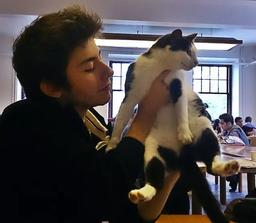| Question | Answer |
|---|---|
| to discuss, to negotiate; to interview | görüşmek |
| to kiss | öpmek |
| to kiss each other | öpüşmek |
| to make love | sevişmek Fun fact: sevişmek used to mean to love each other. When someone said "Ayşe'yle sevişiriz." it used to mean that the speaker and Ayşe love each other. But now it means the speaker and Ayşe have sex on occasion. |
| to meet with each other, to get together, to convene | buluşmak |
| event, incident, happening, phenomenon | olay |
| After the events, the congress convened. | Olaylardan sonra meclis buluştu. |
| I know that Kamil (in his life) never made love. | Ben biliyorum ki Kamil hayatında hiç sevişmedi. In English when we make sentences with never or ever, it automatically refers to the subject's total experience. Like when we say "John never kissed." It automatically means that John has never touched lips with another person in his entire life.
But in Turkish, when we say "John hiç öpüşmedi.", it sounds as if the sentence did not end yet, as if it would continue with something like "at the party" or "on that boat-trip". So we put "hayatında" (in his/her life) to emphasize this point.
Additionally, depending on the subject, it would conjugate as "hayatımda, hayatında, hayatında, hayatımızda, hayatınızda, hayatlarında". |
| to run away, to flee | kaçmak |
| to flee together, to run away in many directions together | kaçışmak |
| After the bombing incidentsLiterally: Explosion events everyone fled together. | Patlama olaylarından sonra herkes kaçıştı. |
| glance, look; point of view | bakış |
| to look at each other | bakışmak |
| My elder brother and his girlfriend are looking at each other. | Abimle kızarkadaşı bakışıyor. |
| to agree, to come to terms, to understand each other | anlaşmak |
| Cansu and you, you understood each other well. | Cansu ve sen iyi anlaştınız. |
| preschool; kindergarten | anaokulu |
| to laugh together | gülüşmek |
| In preschool, little kids always laugh together. | Anaokulunda küçük çocuklar hep gülüşürler. |
| to discuss, to converse, to chat | söyleşmek |
| to fight | dövüşmek |
| When they are little, male siblings sometimes fight. | Erkek kardeşler küçükken bazen dövüşürler. |
Your questions are stored by us to improve Elon.io

